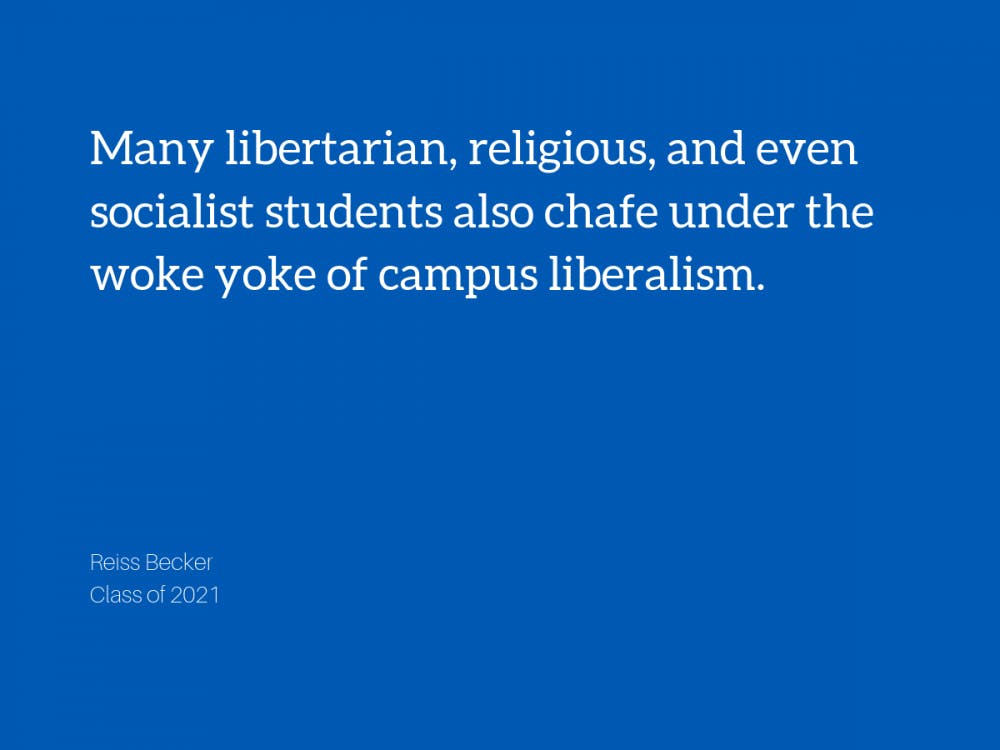In his inaugural column, my friend, David Min, thrust a dagger into a largely nonexistent foe: sincere centrists. Lambasting the mild and moderate wherever they cower, Min argued that centrists “adopt their political affiliation as a result of privilege and general political apathy.” Delving into the psyche of these “Centrist Chads,” Min supposes that they ignore the obligation to seek “absolute truth” and instead “begin with the assumption that moderation is an objective good...”
In essence, the argument is that, out of privilege and apathy, centrists mistake the means of democratic politics (negotiation and compromise) for the ends (institutionalizing what is true and good). Finally, despite having just made a rousing case to the contrary, Min confusingly ends his column by conceding that “it is possible to be well informed about politics, hold oneself to consistent principles, and ultimately end up as a political moderate.” But then, as if regretting his sop to the centrists, Min lurches back into his original posture and assures us that even still he finds it “hard to believe that a majority or even many self-identifying ‘centrists’ fit [that] particular mold” of ideological sincerity and thoughtful consistency.
On this, I agree. Most centrists at Duke, with a few exceptions, are not earnest in their moderation. Where I disagree with Min is in his characterization of those who espouse centrist beliefs. Far from being pampered and aloof, many students, if they take the risk of engaging in political discourse at all, present moderate talking points simply because it is academically and socially precarious to do otherwise.
I know this is true, because it is the lived experience of myself and other college conservatives, especially at elite universities. An alarming number of college Republicans—approximately 73 percent—admit to concealing their genuine beliefs for fear of reprisal from professors.These students are not paranoid “wing-nuts,” they are just rationally responding to the fact that their professors are overwhelmingly liberal. At Duke, for instance, a whopping 3.48 percent of professors are Republicans. To clarify, I am not claiming that the liberal professoriate blatantly discriminates against conservatives. Although there is slight evidence of negative discrimination against conservatives in grading, the more common form of discrimination is a positive discrimination in favor of liberal viewpoints. Hence why so many right-leaning students moderate their views and adopt the mantra “I am a conservative, but my essays are very liberal.”
Of course, professors are not solely responsible for the phenomenon of coerced moderation. Much, if not most, of the reason many conservatives refrain from expressing their beliefs is for fear of social ostracism. This form of punishment is not administered vertically, from administrators and professors on high, but horizontally, from peers. I first experienced this peer pressure when a “friend” of mine had a “talk” with me about my worldview. He was a senior and I was a first-year. With patronizing confidence he clasped his hand on my shoulder and informed me that my sincerely held ethical beliefs were a childish phase. “Just wait,” he said, “eventually you’ll understand how things work.” Surely to his disappointment, I remain an unenlightened brute to this day.
My experiences are hardly unique. If anything, I’ve had it easy. Across the Research Triangle, Republicans at Duke, UNC, and NC State alike have faced death threats, vandalism, and slander. At the University of Minnesota, the young Republican club has had their annual bridge mural illegally defaced for three consecutive years. Down south, at the University of Texas, a liberal activist group threatened to “dox” (broadcast private information about individuals you wish to expose and punish) any and all incoming freshmen who joined conservative organizations such as Young Americans for Liberty or Turning Point USA. I could go on, but the message is clear: your kind isn’t welcome here.
This reality leaves most college conservatives with a choice: they can either drop out of college and voice their political convictions or they can silence their views and graduate in four years with a degree. It’s a false choice.
Moreover, this suppression is not merely limited to conservatives. Many libertarian, religious, and even socialist students also chafe under the woke yoke of campus liberalism. It is hard to approach politics from a freedom-minded or a spiritual or a class-based conception when the campus conversation is suffocated by identitarian liberalism. Although their suppression is not as well publicized as that of conservatives, they deserve to be mentioned and included in this critique.
There is a difference between the Duke student discourse and the Duke student body. The two are often conflated. Based on the progressive flavor of the former, one might assume the Duke student body is overwhelmingly liberal. Certainly a plurality, if not a majority, of Duke students are liberal, but a significant number are not. Without a doubt, the true array of opinions present on our campus is far more diverse than we know.
Sadly, I don’t think we ever will know. For the foreseeable future, I doubt that diversity will be reflected in our campus discourse. Instead, we will rinse, wash, and repeat the same stale campus debates which are inevitably dominated by a cast of the usual suspects. Most of those who passionately dissent will never say so. They will obscure their true opinions with moderate platitudes such as “well I can see both sides.” But never forget that Duke has plenty of ideological diversity—most students just aren’t speaking up.
Reiss Becker is a Trinity junior. His column, “roused rabble,” runs on alternate Wednesdays.
Get The Chronicle straight to your inbox
Signup for our weekly newsletter. Cancel at any time.

